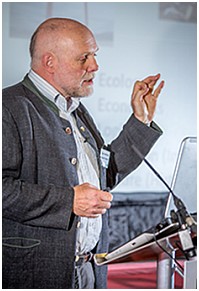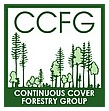Scottish Forestry Trust Keynote Lecture – A Global Overview of the Future of Alternative Silviculture Practices

Speaker:

Klaus Puettmann
Edmund Hayes Professor in Silviculture Alternatives,
Oregon State University
Website: www.cof.orst.edu/cof/fs/kpuettmann/group.htm
Biography:
Klaus Puettmann is Edmund Hayes Professor in Silviculture Alternatives at Oregon State University. He grew up in Germany and received a degree from Albert-Ludwig University, Freiburg and from Oregon State University. He was a faculty member at the University of Minnesota from 1992 to 2000 and has been working at OSU since 2001. He has published over 75 peer reviewed papers and two books. His research interests include silviculture and stand development of diverse structured forests, spatial dynamics of plant interactions, and density management. His most recent efforts focused on management aspects that increase adaptability and resilience of forest ecosystems.
Synopsis of Presentation:
Continuous-cover forestry and similar alternative silviculture approaches are defined by a set of practices, including 1) partial harvests, 2) variability at small spatial scales 3) mixed species, 4) strong preference for natural regeneration, and 5) avoidance of intensive site preparation and weed control practices. This talk addresses the questions: what is limiting the wider, global application of alternative silviculture approaches and what can we learn from our understanding of these limitations? The presentation highlights how assumptions about social and economic settings, logistic and administrative challenges, and ecological conditions relate to the global implementation of alternative silviculture practices. The talk concludes by suggesting to move beyond an emphasis on principles and practices and develop a sound scientific foundation for alternative silviculture approaches. This foundation should specifically address two future challenges: 1) a renewed focus on managing for multiple values and 2) a special emphasis how management affects the capacity of ecosystems to adapt to changing environmental, social, and economic conditions.
Conference Resource:
- Download/View Klaus Puettmann’s Presentation [PDF, 3.2 MB]
- Watch Klaus Puettmann’s Presentation [Youtube]
Websites and References:
- www.resalliance.org
- Brang, P., Spathelf, P. Larsen, P.B., Bauhus, J. Boncina, A., Chauvin, C., Drossler, L. Garcia-Guemes, C., Heiri, C. ; Kerr, G. Lexer, M.J., Mason, W. Mohren, F. Muhlethaler, U., Nocentini, S., Svoboda, M. 2014. Forestry doi: 10.1093/forestry/cpu018
- Gustafsson, L., S. C. Baker, J. Bauhus, W. J. Beese, A. Brodie, J. Kouki, D. B. Lindenmayer, A. Lõhmus, G. M. Pastur, and C. Messier. 2012. Retention forestry to maintain multifunctional forests: a world perspective. BioScience 62:633-645.
- Messier, C. , Puettmann, K.J. and D. Coates (edts.) 2013. Managing Forests as Complex Adaptive Systems: Building Resilience to the Challenge of Global Change. Earthscan, London. Link
- Puettmann, K.J. 2014. Restoring the adaptive capacity of forest ecosystems. Journal of Sustainable Forestry. 33:sup1, S15-S27.
- Filotas, E., L. Parrott, P.J. Burton, R.L. Chazdon, K.D. Coates, L. Coll, S. Haeussler, K. Martin, S. Nocentini, K.J. Puettmann, F.E. Putz, S.W. Simard, and C. Messier. 2014. Viewing forests through the lens of complex systems science.


